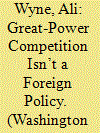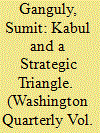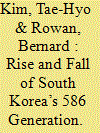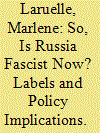|
|
|
Sort Order |
|
|
|
Items / Page
|
|
|
|
|
|
|
| Srl | Item |
| 1 |
ID:
189037


|
|
|
|
|
| Summary/Abstract |
History sometimes has a way of repeating itself. Russia’s war against Ukraine marks the definite return of spheres of influence on the European continent. A new Iron Curtain is descending. This time, the frontier is further east than it was during the Cold War. It runs from Belarus to the North to the Black Sea in the South—and the exact line of the front is as yet unclear. Will it run through and divide Ukraine? Will it encompass Moldova? The current Russian regime sees all these countries and territories as “theirs”—not only as within their sphere of influence, but also as a sphere of occupation, wherein Russia’s imperial ambitions are impressed on these countries with brutal military force.
|
|
|
|
|
|
|
|
|
|
|
|
|
|
|
|
| 2 |
ID:
189033


|
|
|
|
|
| Summary/Abstract |
The past year has witnessed two major developments that have trained the sights of US policymakers more sharply on America’s chief strategic competitors. First, the conclusion of a protracted US intervention in Afghanistan would seem to offer Russia and China an opening to make strategic inroads across Central Asia. Second, Russia’s brutal invasion of Ukraine has raised the specter of a military confrontation between nuclear-armed powers and revealed China to be, while not actively supporting Russian atrocities, then at least concerningly unmoved by them.
|
|
|
|
|
|
|
|
|
|
|
|
|
|
|
|
| 3 |
ID:
189036


|
|
|
|
|
| Summary/Abstract |
In the wake of the American withdrawal from Afghanistan and the Taliban takeover, three major regional states—Pakistan, India, and the People’s Republic of China (PRC)—all have significant and overlapping stakes in the future of Afghanistan. As the Taliban struggles to govern an utterly impoverished land, all three have been carefully monitoring developments in the country. Simultaneously, they are keeping a close watch on the choices of the other two. As this essay argues, all three states are keen on ensuring that they will be able to wield a modicum of influence in the country for different as well as overlapping reasons. Pakistan’s goals will remain geostrategic: ensuring that the Taliban maintain their anti-India stance and sympathy for Islamabad’s concerns. The PRC’s interests in the country, meanwhile, will be twofold, both economic and strategic. It will look for ways to obtain access to rare earths and simultaneously attempt to ensure that pan-Islamic sentiment does not percolate from Afghanistan into its restive province of Xinjiang. Chinese and Pakistani interests in Afghanistan are likely to dovetail. Consequently, in all likelihood the US will turn to India to deal with concerns about the PRC, and also for intelligence cooperation purposes.
|
|
|
|
|
|
|
|
|
|
|
|
|
|
|
|
| 4 |
ID:
189035


|
|
|
|
|
| Summary/Abstract |
Despite the international community’s best efforts to prevent the regime from acquiring nuclear weapons, North Korea has developed an increasingly sophisticated nuclear arsenal since its first nuclear test in 2006. In 2017, the regime tested high-yield warheads, an array of short- to medium-range missiles, and even an intercontinental ballistic missile (ICBM) that could put most US cities at risk. In 2022, North Korea broke its four-year moratorium on testing ICBMs and added hypersonic missiles capable of maneuvering at high speed to its list of expanding missile tests. Pyongyang even boasted that it can “shake the world by firing a missile with the US mainland in its range,” highlighting the regime’s willingness to threaten the United States with its new arsenal.Footnote
|
|
|
|
|
|
|
|
|
|
|
|
|
|
|
|
| 5 |
ID:
189034


|
|
|
|
|
| Summary/Abstract |
Washington’s biggest concern in its relationship with South Korea has been returning to a stance consistent with active engagement in the Indo-Pacific region. In response to June 2020 remarks by a senior South Korean official that his country had the right to choose between the US and China, the US State Department commented that South Korea had already chosen the US several decades ago when it abandoned authoritarianism and embraced democracy.Footnote1 In October 2021, although Washington officially welcomed the declaration of an end to the Korean War—a proposal that had been promoted for several years by the Moon Jae-in administration—the Biden administration expressed de facto opposition by insisting that it be linked to tangible North Korean denuclearization measures.
|
|
|
|
|
|
|
|
|
|
|
|
|
|
|
|
| 6 |
ID:
189042


|
|
|
|
|
| Summary/Abstract |
The US exit from Afghanistan, together with other geopolitical tremors, prompted commentary suggesting that Washington’s credibility had been badly shredded such that its allies no longer view it as a trustworthy partner. Yet despite such dire assessments, the three Baltic states remain confident that in their hour of need, the US would marshal its armed forces and come to their aid. While for many the phrase “indispensable nation” provokes scorn and eye-rolling, a majority of Estonians, Latvians, and Lithuanians view the US precisely in that light. How do we account for the fact that this part of Europe has proven to have such fertile and resilient soil for pro-American sentiment? What explains the remarkable staying power of this phenomenon?
|
|
|
|
|
|
|
|
|
|
|
|
|
|
|
|
| 7 |
ID:
189038


|
|
|
|
|
| Summary/Abstract |
On February 24, 2022, Russian President Vladimir Putin ordered Russian troops to invade eastern Ukraine to carry out a “special military operation.” This latest war in Russia's neighborhood recalls its annexation of Crimea in 2014 and its conflict with Georgia in 2008. Many believe that Russia is seeking to establish a sphere of influence in its backyard, with a view toward restoring some of the old influence of various elements of the Soviet Union and the Russian Empire.
|
|
|
|
|
|
|
|
|
|
|
|
|
|
|
|
| 8 |
ID:
189041


|
|
|
|
|
| Summary/Abstract |
Russia’s horrific war in Ukraine has sharply revived debate over charges of Russia’s fascist behavior. The most vocal voices in this debate are Yale historian Timothy Snyder, who has proclaimed that “Putin’s regime … is the world center of fascism,” and authored an op-ed in The New York Times entitled “We Should Say It: Russia Is Fascist.”Footnote1 Similar arguments are advanced by Rutgers political scientist Alexander Motyl, who asserted in a recent piece that Russia fits the textbook definition of fascism.Footnote2 State leaders currently fighting against Russia share that view: Ukrainian president Volodymyr Zelensky has labelled Russia’s actions as fascist and drawn parallels between Putin’s Russia and Nazi Germany.Footnote3 Polish President Andrzej Duda followed suit, stating that “today Russian leaders are behaving in exactly the same way, like Hitler, like the German SS, like the German pilots of the fascist army during World War II.”Footnote4 Among Russian social scientists abroad as well as those courageously resisting at home, the debate about Russia’s "fascism" has also become central in discussing post-February 24 transformations, most of them concluding that Russia does not (yet?) fit the typology.
|
|
|
|
|
|
|
|
|
|
|
|
|
|
|
|
| 9 |
ID:
189039


|
|
|
|
|
| Summary/Abstract |
Whether spheres of influence stabilize or disrupt international security and how the United States should respond to efforts by other actors to establish spheres is at the forefront of contemporary grand strategy debates. For many in Washington, the answer is clear: spheres of influence are dangerous and destabilizing relics of centuries past which have no place in the modern world. In this rendering, spheres contradict American values, threaten to upend the liberal international order, promote great power competition, and ultimately destabilize international politics writ large. And at a time when many in Washington claim that Moscow and Beijing are crafting their own spheres in Eastern Europe and Asia, the policy implications of this position are clear: if a choice must be made between opposing or acknowledging these efforts, the United States must actively resist their creation.
|
|
|
|
|
|
|
|
|
|
|
|
|
|
|
|
| 10 |
ID:
189040


|
|
|
|
|
| Summary/Abstract |
Russia’s invasion of Ukraine has shocked Western observers. Seizures of territory, mass expulsions, and all-out assaults on Ukrainian culture hearken back to an earlier, darker era in European history—the era of empire. Indeed, the conflict may be the 21st century’s first imperial war. For President Vladimir Putin and many others in the Russian elite, Ukraine’s underlying provocation lay not so much in its aspiration to join NATO or the European Union, but in the very temerity it displayed in existing at all. Expressing ideas that are widespread among Russian thinkers and politicians, Putin has argued that Ukrainians and Russians are, as he put it in 2014, “one people, a single whole”—and that because he considers Ukraine part of Russia’s own historic patrimony, Moscow retains the right to conquer and reshape it with no regard for its inhabitants.
|
|
|
|
|
|
|
|
|
|
|
|
|
|
|
|
|
|
|
|
|